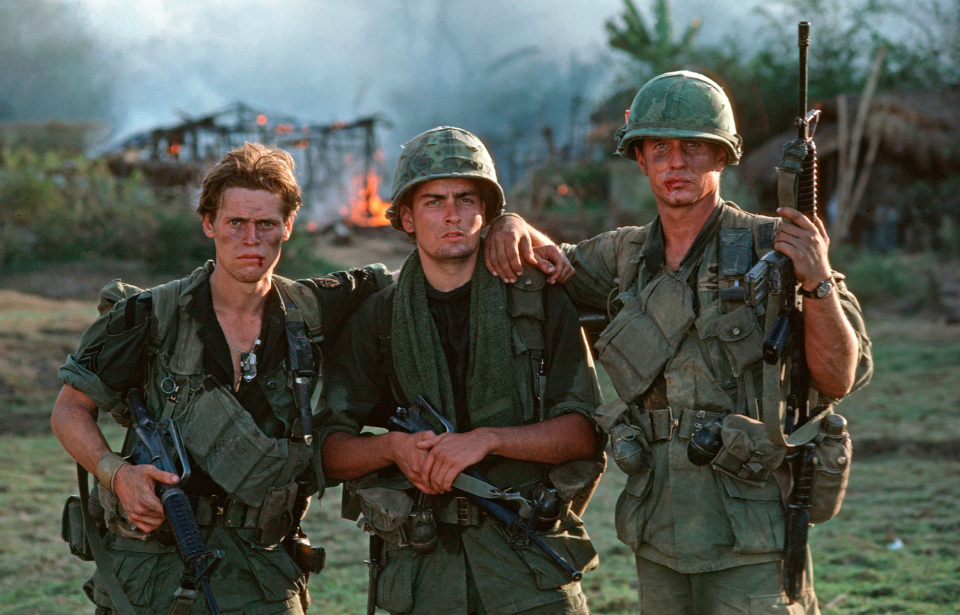Platoon (1986) received widespread praise for its portrayal of the Vietnam War. Starring Charlie Sheen, Tom Berenger, and Willem Dafoe, the film was directed by Oliver Stone, who based it on his own experiences in the military during that time.
If you enjoyed Platoon, here are six other movies set in Vietnam that we think you’ll enjoy.
Full Metal Jacket (1987)
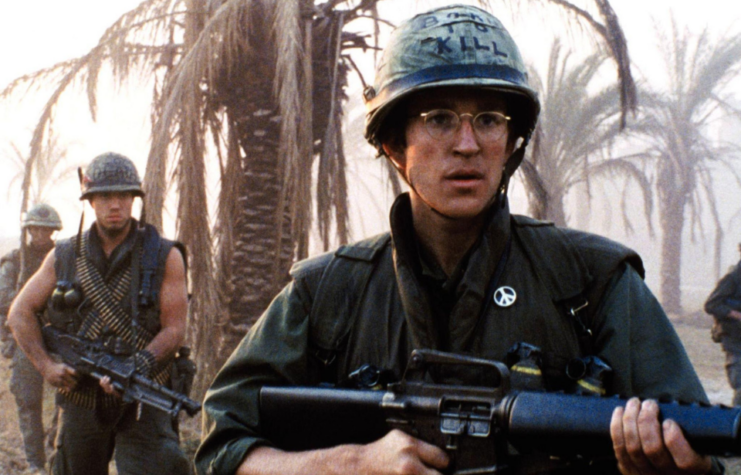
Full Metal Jacket (1987), directed by Stanley Kubrick, is a movie that’s divided into two distinct parts, each offering a unique perspective on the experiences of US Marines during the Vietnam War.
The first half follows a group of young recruits through their grueling training at the Marine Corps Recruit Depot, Parris Island, where they’re subjected to intense physical and psychological challenges under the harsh guidance of the tough-talking Gunnery Sgt. Hartman (R. Lee Ermey). This part explores the dehumanizing process of turning civilians into disciplined soldiers and delves into the psychological toll that such training takes on the recruits.
The second half shifts to the Vietnam War itself and follows Pvt. J.T. “Joker” Davis (Matthew Modine) as he becomes a combat correspondent for Stars and Stripes. The movie takes audiences into the chaotic and brutal realities of the conflict, highlighting the harsh environment, the camaraderie among soldiers and the moral dilemmas they face in the midst of violence.
Full Metal Jacket delves into themes of dehumanization, the impact of war, the duality of human nature and the psychological effects of military training. Kubrick’s distinctive directing style, attention to detail and stark visual presentation contribute to the movie’s impactful portrayal of the Vietnam War, and the film’s structure allows it to explore both the training process that molds soldiers and the consequences of said training in the context of actual combat.
Hamburger Hill (1987)
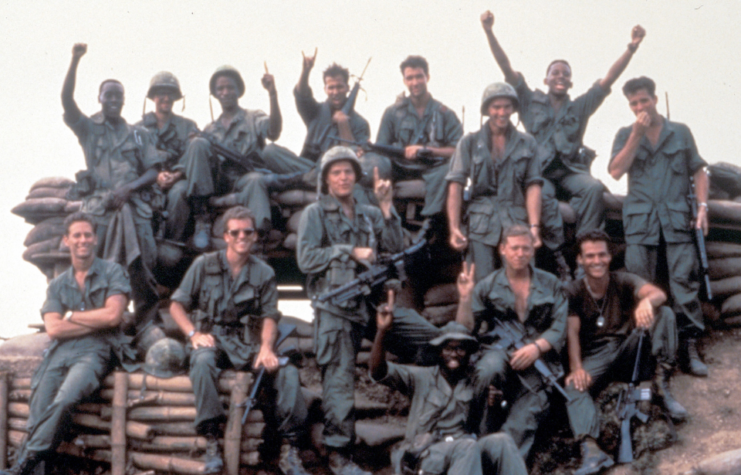
Hamburger Hill (1987) draws its inspiration from the real-life Battle of Hamburger Hill during the Vietnam War. The film delivers a raw and realistic portrayal of the intense and brutal combat experienced during the 10-day effort to capture Hill 937—nicknamed “Hamburger Hill”—in mid-May 1969.
The narrative centers on a platoon of young, diverse soldiers as they push forward against a heavily fortified enemy position. The battle is depicted in vivid detail, emphasizing the challenges, sacrifices, and horrors the soldiers face while navigating dangerous terrain and engaging in relentless combat.
Hamburger Hill explores the futility of some military operations during the Vietnam War, as the soldiers question the purpose and strategic significance of the hill they are fighting to take. The film also addresses the controversies and debates surrounding the war back home and the disconnect between the soldiers on the ground and the decisions made by high-ranking officers.
Through its realistic depiction of warfare, Hamburger Hill illustrates the physical and emotional toll combat takes on soldiers, highlighting the complexities and moral dilemmas inherent in war. The film pays tribute to those who fought in the battle and offers a sobering reflection on the human cost of armed conflict.
The Deer Hunter (1978)
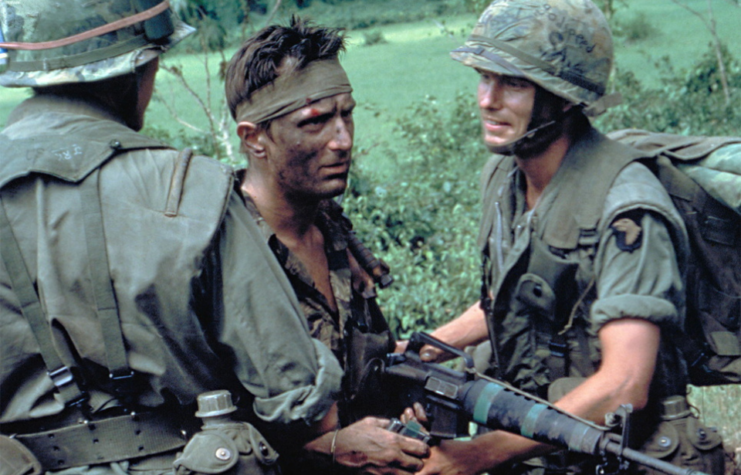
The Deer Hunter (1978) chronicles the lives of three working-class friends – Michael “Mike” Vronsky (Robert De Niro), Steven Pushkov (John Savage), and Nickanor Chevotarevich (Christopher Walken) – in a small Pennsylvania steel town before, during and after their traumatic experiences in the Vietnam War.
Split into three distinct acts, the film first delves into the characters’ daily lives and relationships at home. It then portrays their time as prisoners of war (POWs) in Vietnam, before transitioning to their struggles to cope with the physical and psychological aftermath of the conflict.
Exploring themes of friendship, the toll of war, combat trauma and the challenges of reintegrating into civilian life, The Deer Hunter vividly captures the psychological horrors of war, epitomized by its iconic Russian roulette scenes in the Vietnamese prison camp.
Moreover, the film delves into how war molds individuals and shapes their outlooks. De Niro’s character undergoes a profound evolution, grappling with survivor’s guilt and striving to support his friends as they continue to wrestle with the enduring effects of their shared trauma.
Apocalypse Now (1979)
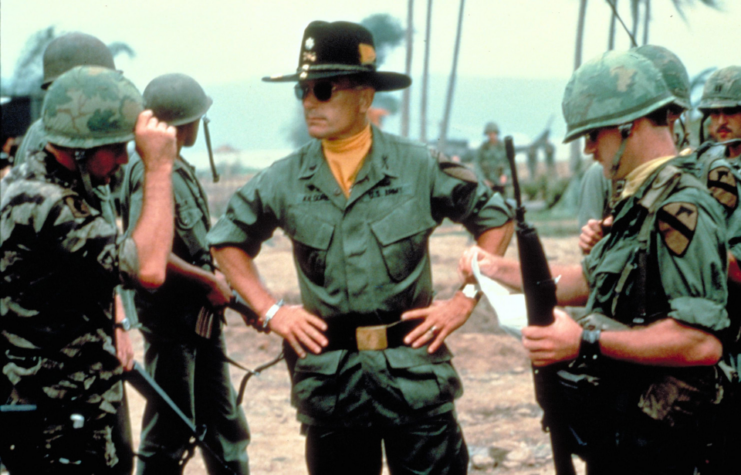
Apocalypse Now (1979) is a sprawling war epic directed by Francis Ford Coppola, adapted from Joseph Conrad’s novella, Heart of Darkness. It follows the harrowing journey of Capt. Benjamin Willard (Martin Sheen), a US Army officer dispatched on a mission to locate and “terminate with extreme prejudice” Col. Walter E. Kurtz (Marlon Brando), a rogue Special Forces officer deep in the jungles of Cambodia.
The film is notable for its grim and hallucinatory depiction of the psychological toll of warfare. As Willard journeys upstream aboard a US Navy patrol boat, he encounters a series of increasingly disturbing and surreal events, laying bare the disorder, savagery, and ethical ambiguity of war, alongside the mental deterioration of soldiers caught in its grip.
Willard’s expedition to Kurtz’s remote compound unravels into a descent into madness, where he grapples with personal demons and challenges conventional notions of authority, power, and the futility of armed conflict. Apocalypse Now explores themes of inherent human darkness, the blurred lines between civilization and barbarism, and the ethical questions posed by warfare.
Casualties of War (1987)
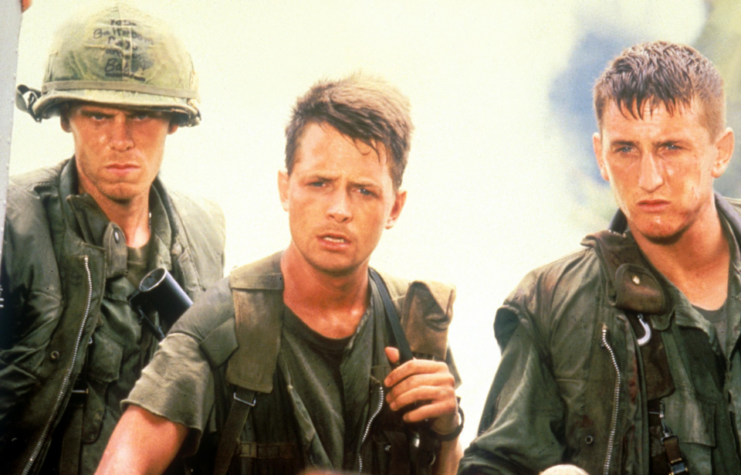
Casualties of War (1987) is based on the true story of a group of American soldiers during the Vietnam War who commit a horrific crime against a young Vietnamese woman.
The movie follows Pvt. Max Eriksson (Michael J. Fox), a morally conscious soldier who becomes a witness and an unwilling participant in the abduction, assault and murder of a Vietnamese girl by his comrades. As events progress, Eriksson struggles with his sense of duty, morality and loyalty as he tries to prevent and, then, expose the crime.
The movie offers a sobering and disturbing look at the brutal realities of war and the potential for cruelty that can emerge in the midst of conflict. Its portrayal of the internal conflict faced by Eriksson and the ethical dilemmas he confronts add depth to the narrative and highlight the complexities of human behavior in extreme circumstances. The film serves as a powerful exploration of the dark side of war and the capacity for cruelty and compassion that can coexist within individuals.
Born on the Fourth of July (1989)
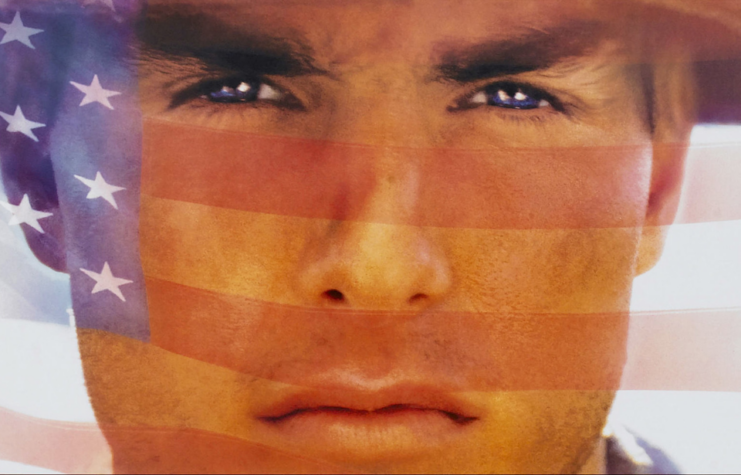
Born on the Fourth of July (1989) is a biographical war drama helmed by Oliver Stone, depicting the true story of Ron Kovic. The film charts Kovic’s evolution from a spirited and patriotic youth to a disenchanted anti-war activist in the aftermath of the Vietnam War.
The movie stars Tom Cruise as Kovic, capturing his journey from a hopeful teenager eagerly enlisting in the US Marine Corps to a paralyzed veteran who emerges as a vocal critic of the Vietnam War and a staunch advocate for veterans’ rights.
New! Want to become a trivia master? Sign up for our War History Fact of the Day newsletter!
More from us: Dale Dye Ensured These Military Movies Were As Authentic As Possible
The movie delves into themes of patriotism, disillusionment, the personal and societal toll of war, and the challenges veterans face upon returning home. It poignantly portrays Kovic’s struggles, both physical and emotional, following his combat injury, highlighting his difficult adjustment to a new reality.
